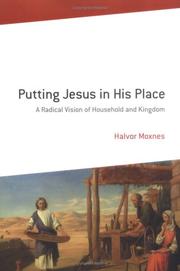| Listing 1 - 10 of 15 | << page >> |
Sort by
|
Book
ISBN: 9781848850804 1848850808 Year: 2012 Publisher: London Tauris
Abstract | Keywords | Export | Availability | Bookmark
 Loading...
Loading...Choose an application
- Reference Manager
- EndNote
- RefWorks (Direct export to RefWorks)
The great German theologian Albert Schweitzer famously drew a line under 19th century historical Jesus research by showing that at the bottom of the well lay not the face of Joseph's son, but rather the features of all the New Testament scholars who had tried to reveal his elusive essence. In his thoughtful and provocative new book, Halvor Moxnes takes Schweitzer's observation much further: the doomed 'quest for the historical Jesus' was determined not only by the different personalities of the seekers who undertook it, but also by the social, cultural and political agendas of the countries from which their presentations emerged. Thus, Friedrich Schleiermacher's Jesus was a teacher, corresponding with the role German teachers played in Germany's movement for democratic socialism. Ernst Renan's Jesus was by contrast an attempt to represent the 'positive Orient' as a precursor to the civilized self of his own French society. Scottish theologian G.A. Smith demonstrated in his manly portrayal of Jesus a distinctively British liberalism and Victorian moralism. Moxnes argues that one cannot understand any 'life of Jesus' apart from nationalism and national identity: and that what is needed in modern biblical studies is an awareness of all the presuppositions that underlie presentations of Jesus, whether in terms of power, gender, sex and class. Only then, he says, can we start to look at Jesus in a way that does him justice.
Christianity and culture --- Christianisme et civilisation --- History --- Histoire --- Jesus Christ --- Historicity. --- 225*1 --- Leven van Jezus Christus in het Nieuwe Testament. Historische Jezus Christus --- Geschichtlichkeit. --- Leben-Jesu-Forschung. --- Nationalismus. --- Theologie. --- Jesus Christus. --- Biography --- History and criticism. --- Historicity --- History of doctrines --- Geschichte 1800-1900. --- 225*1 Leven van Jezus Christus in het Nieuwe Testament. Historische Jezus Christus
Book
ISBN: 0800615484 9780800615482 Year: 1988 Publisher: Philadelphia (Pa.): Fortress
Abstract | Keywords | Export | Availability | Bookmark
 Loading...
Loading...Choose an application
- Reference Manager
- EndNote
- RefWorks (Direct export to RefWorks)
Sociology, Biblical. --- Economics in the Bible. --- 226.4 --- Sociology, Biblical --- Economics in the Bible --- Christian sociology --- Religion and sociology --- Evangelie volgens Lucas --- Biblical teaching --- Bible. --- Luc (Book of the New Testament) --- Lucas (Book of the New Testament) --- Luka (Book of the New Testament) --- Lukan săn zăn︠g︡g (Book of the New Testament) --- Lukas (Book of the New Testament) --- Luke (Book of the New Testament) --- Lūqā (Book of the New Testament) --- Nuga pogŭm (Book of the New Testament) --- Ruka den --- Ruka ni yoru fukuinsho --- Criticism, interpretation, etc.

ISBN: 9004061401 0585373388 9780585373386 9789004061408 Year: 1980 Volume: v. 53 Publisher: Leiden Brill
Abstract | Keywords | Export | Availability | Bookmark
 Loading...
Loading...Choose an application
- Reference Manager
- EndNote
- RefWorks (Direct export to RefWorks)
Bible --- Theology --- God --- Biblical teaching --- 227.1*1 --- -227.1*1 Brief van Paulus aan de Romeinen --- Brief van Paulus aan de Romeinen --- Metaphysics --- Misotheism --- Monotheism --- Religion --- Theism --- Bible. --- Theology. --- 227.1*1 Brief van Paulus aan de Romeinen --- Epître aux Romains (Book of the New Testament) --- List do Rzymian (Book of the New Testament) --- Roma-sŏ --- Római levél --- Romans (Book of the New Testament) --- Romasŏ --- Biblical teaching. --- God (Christianity) --- God (Judaism)

ISBN: 0415146380 0415146399 0415146399 Year: 1997 Publisher: New York Routledge
Abstract | Keywords | Export | Availability | Bookmark
 Loading...
Loading...Choose an application
- Reference Manager
- EndNote
- RefWorks (Direct export to RefWorks)
Particular emphasis is given to how family metaphors, such as 'brotherhood' function to describe relations in early Christian communities. Asceticism and the rejection of sexuality are considered in the context of Christian constructions of the family. Moxnes' volume presents a comprehensive and timely addition to the study of familial and social structures in the Early Christian world, which will certainly stimulate further debate. The family is a topical issue for studies of the ancient world. Family, household and kinship have different connotations in antiquity from their modern ones. This volume expands that discussion to investigate the early Christian family structures within the larger Graeco-Roman context.
Families --- Sociology, Biblical. --- Jewish families --- Religion and sociology --- Biblical teaching. --- Religious life. --- Religious aspects --- Christianity --- History of doctrines --- Bible. --- Criticism, interpretation, etc. --- Rome --- Religion. --- Social conditions. --- Sociology, Biblical --- Family --- Family life --- Family relationships --- Family structure --- Relationships, Family --- Structure, Family --- Social institutions --- Birth order --- Domestic relations --- Home --- Households --- Kinship --- Marriage --- Matriarchy --- Parenthood --- Patriarchy --- Christian sociology --- Religion and society --- Religious sociology --- Society and religion --- Sociology, Religious --- Sociology and religion --- Sociology of religion --- Sociology --- Jewish way of life --- Biblical teaching --- Religious life --- Social aspects --- Social conditions --- Ba-yon Tipan --- Bagong Tipan --- Jaji ma Hungi --- Kainē Diathēkē --- New Testament --- Nouveau Testament --- Novo Testamento --- Novum Testamentum --- Novyĭ Zavet --- Novyĭ Zavi︠e︡t Gospoda nashego Īisusa Khrista --- Novyĭ Zavit --- Nuevo Testamento --- Nuovo Testamento --- Nye Testamente --- Perjanjian Baru --- Dhamma sacʻ kyamʻʺ --- Injīl

ISBN: 1134757441 1280319968 0203440498 0203280598 9780203280591 9780203440490 9780415146388 0415146380 9780415146395 0415146399 9781134757442 9781134757398 1134757395 9781134757435 1134757433 Year: 1997 Publisher: London New York Routledge
Abstract | Keywords | Export | Availability | Bookmark
 Loading...
Loading...Choose an application
- Reference Manager
- EndNote
- RefWorks (Direct export to RefWorks)
Constructing Early Christian Families explores the complex picture of family relations and the manifold attitudes to the family in the early Christian world.
Families --- Sociology, Biblical. --- Jewish families --- Religion and sociology --- Religion and society --- Religious sociology --- Society and religion --- Sociology, Religious --- Sociology and religion --- Sociology of religion --- Sociology --- Family --- Family life --- Family relationships --- Family structure --- Relationships, Family --- Structure, Family --- Social institutions --- Birth order --- Domestic relations --- Home --- Households --- Kinship --- Marriage --- Matriarchy --- Parenthood --- Patriarchy --- Jewish way of life --- Christian sociology --- Biblical teaching. --- Religious life. --- Religious aspects --- Christianity --- History of doctrines --- Social aspects --- Social conditions --- Biblical teaching --- Bible. --- Ba-yon Tipan --- Bagong Tipan --- Jaji ma Hungi --- Kainē Diathēkē --- New Testament --- Nouveau Testament --- Novo Testamento --- Novum Testamentum --- Novyĭ Zavet --- Novyĭ Zavi︠e︡t Gospoda nashego Īisusa Khrista --- Novyĭ Zavit --- Nuevo Testamento --- Nuovo Testamento --- Nye Testamente --- Perjanjian Baru --- Dhamma sacʻ kyamʻʺ --- Injīl --- Criticism, interpretation, etc. --- Rome --- Religion. --- Social conditions.
Book
ISBN: 0755603540 0857735527 1786739577 9780857735522 9781786739575 9781780766072 1780766076 1780766084 9781780766089 Year: 2019 Publisher: London England : London : I.B. Tauris, Bloomsbury Publishing,
Abstract | Keywords | Export | Availability | Bookmark
 Loading...
Loading...Choose an application
- Reference Manager
- EndNote
- RefWorks (Direct export to RefWorks)
Few documents in world history can match the inspirational impact of the New Testament. For all its variety -- gospels, letters and visions -- this first-century collection of texts keeps always at its centre the enigmatic figure of Joshua/Jesus: the Jewish prophet who gathered a group around him, proclaimed the imminent end of the world, but was made captive by the authorities of Rome only to suffer a shameful criminal's death on a cross. When his followers (including former persecutor Saul/Paul) became convinced that Jesus had defeated extinction, and had risen again to fresh life, the movement crossed over from Palestine to ignite the entire Graeco-Roman Mediterranean world. The author shows how the writings of this vibrant new faith came into being from oral transmission and then became the pillar of a great world religion. He explores their many varied usages in music, liturgy, art, language and literature. In discussing its textual origins, as well as its later reception, Moxnes shows above all how the New Testament has been employed both as a tool for liberation and as a means of power and control.
Bible. --- Ba-yon Tipan --- Bagong Tipan --- Jaji ma Hungi --- Kainē Diathēkē --- New Testament --- Nouveau Testament --- Novo Testamento --- Novum Testamentum --- Novyĭ Zavet --- Novyĭ Zavi︠e︡t Gospoda nashego Īisusa Khrista --- Novyĭ Zavit --- Nuevo Testamento --- Nuovo Testamento --- Nye Testamente --- Perjanjian Baru --- Dhamma sacʻ kyamʻʺ --- Injīl --- Biblical exegesis & hermeneutics
Book
Year: 1980 Publisher: Leiden Brill
Abstract | Keywords | Export | Availability | Bookmark
 Loading...
Loading...Choose an application
- Reference Manager
- EndNote
- RefWorks (Direct export to RefWorks)

ISBN: 0664223109 Year: 2003 Publisher: London Westminster John Knox Press
Abstract | Keywords | Export | Availability | Bookmark
 Loading...
Loading...Choose an application
- Reference Manager
- EndNote
- RefWorks (Direct export to RefWorks)
Jesus Christ --- Homes and haunts --- Galilee (Israel) --- Social life and customs.
Book
ISBN: 0755624556 1280512148 9786613595294 0857720821 9780857720825 9781848850804 1848850808 Year: 2011 Publisher: London : I.B. Tauris,
Abstract | Keywords | Export | Availability | Bookmark
 Loading...
Loading...Choose an application
- Reference Manager
- EndNote
- RefWorks (Direct export to RefWorks)
"The great German theologian Albert Schweitzer famously drew a line under 19th century historical Jesus research by showing that at the bottom of the well lay not the face of Joseph's son, but rather the features of all the New Testament scholars who had tried to reveal his elusive essence. In his thoughtful and provocative new book, Halvor Moxnes takes Schweitzer's observation much further: the doomed 'quest for the historical Jesus' was determined not only by the different personalities of the seekers who undertook it, but also by the social, cultural and political agendas of the countries from which their presentations emerged. Thus, Friedrich Schleiermacher's Jesus was a teacher, corresponding with the role German teachers played in Germany's movement for democratic socialism. Ernst Renan's Jesus was by contrast an attempt to represent the 'positive Orient' as a precursor to the civilized self of his own French society. Scottish theologian G A Smith demonstrated in his manly portrayal of Jesus a distinctively British liberalism and Victorian moralism. Moxnes argues that one cannot understand any 'life of Jesus' apart from nationalism and national identity: and that what is needed in modern biblical studies is an awareness of all the presuppositions that underlie presentations of Jesus, whether in terms of power, gender, sex and class. Only then, he says, can we start to look at Jesus in a way that does him justice."--Bloomsbury Publishing.
Jesus Christ --- Biography --- History and criticism. --- Historicity --- History of doctrines --- Nationalism --- Religious aspects --- Christianity. --- Historicity.
Book
Year: 1980 Publisher: Leiden Brill
Abstract | Keywords | Export | Availability | Bookmark
 Loading...
Loading...Choose an application
- Reference Manager
- EndNote
- RefWorks (Direct export to RefWorks)
| Listing 1 - 10 of 15 | << page >> |
Sort by
|

 Search
Search Feedback
Feedback About UniCat
About UniCat  Help
Help News
News